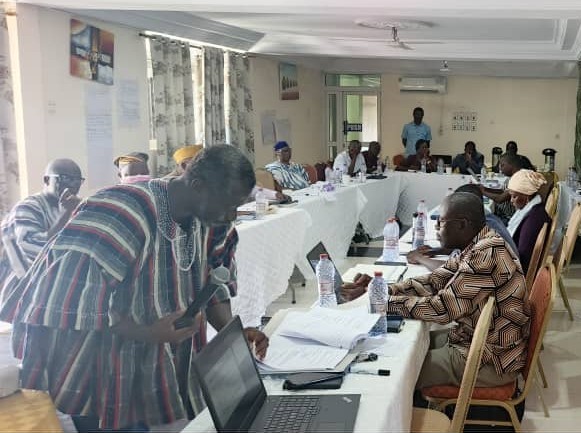The Faculty of Integrated Development Studies (FIDS) of the Simon Diedong Dombo University of Business and Integrated Development Studies (SDD-UBIDS), on September 8, 2025, organised a training programme to give faculty members the opportunity to retool and enhance their teaching skills.
Prof. Africanus Lewil Diedong, Dean of FIDS, in his opening remarks, commended Senior Members of the Faculty for making time to attend the training programme, stressing that it was a demonstration of their commitment to opening up for new ideas in teaching. “I appreciate your dedication to attending the training session.” The programme perfectly aligns with Strategic Issue Three of the FIDS Strategic Plan – 2023-2027, which centres on Teaching, Training, and Research, he stated.
Prof. Diedong noted that the goal of the strategic issue area was to produce holistic, high-skill and competent graduates for the contemporary job market, adding that the goal could best be achieved by availing senior members of the opportunity to retool and enhance their teaching skills.
“As faculty, we are cognisant of the fact that the quality of teaching impacts the calibre of our graduates; hence, this training session contributes to efforts to ensure that lecturers incorporate innovative approaches and skills into teaching students,” he said.
Prof. Dennis Puorideme, an Accredited Instructional Skills Workshop (ISW) Facilitator as well as an Academic Programmes Assessor for the Ghana Tertiary Education Commission (GTEC), facilitated the workshop, drawing from guidelines from both ISW and GTEC and blending them well with practical experiences in the teaching field.
Prof. Puorideme, who is also the HoD for the Department of African and Endogenous Studies (DAES), stressed the need to teach in accordance with guidelines and procedures in departmental programme documents approved and accredited by GTEC.
He implored teaching staff to design and implement lessons with clear learning objectives and assessment schemes and aim to develop students’ knowledge, skills, and competencies.
Participants of the training programme were taken through various topics including “Preparation for Teaching”, “Teaching Techniques”, “Lesson Planning”, “Practical Lesson Delivery”, “Design and Implement Assessment”, as well as an example of a “Practical Lesson”.
Dr. Francis Nangbeviel Sanyare, Head of Department (HoD) for the Department of Development Studies, said the training programme provided him with the opportunity to reinforce the technical requirements of teaching, including preparation and delivery.
“Secondly, it facilitated reflection on often overlooked aspects that contribute to the enjoyment, effectiveness, and efficiency of teaching and learning,” he said.
He added that the training programme exposed him to novel terminology and teaching approaches that are pertinent to the evolving educational landscape. “For instance, it emphasised that students are now referred to as learners, participants, or even both, and that learning is more collaborative than instructive, adopting a bottom-up rather than a top-down approach,” Dr. Sanyare stressed.
Even more instructive for the HoD for Development Studies was the opportunity to realise that there could be multiple lessons in a single lecture and, more importantly, that a typical effective lesson should not exceed ten minutes. “It was intriguing to learn how to plan and deliver an impactful, collaborative, learner-inclusive lesson within this given time,” he noted.
Dr Sanyare emphasised that the training broke down hierarchical barriers, thus enabling the realisation of how such barriers effectively serve to block learning opportunities within the traditionally known and applied teaching approaches that I was accustomed to.
Dr. Amos Dordah, HoD for the Department of Communication Studies, described the training as highly impactful and stressed the need for the Faculty to continue to organise more of such programmes for staff to remain abreast with modern and innovative ways of teaching.
According to him, this will ensure the realisation of the full benefits of the Faculty’s Strategic Plan.
Prof. Abdul-Kadri Yahaya, HoD for the Department of Environment and Resource Studies, noted that the workshop had enhanced his teaching methodology.
Amanda Wiasekor Tembile, a Graduate Teaching Assistant at DECS, described the workshop as a transformative experience for a novice like her, asserting that it would fundamentally alter her approach to lesson planning and delivery. “If the Faculty continue to organise more of such training programmes, it will highly benefit the Graduate Teaching Assistants within the Faculty,” she noted.


